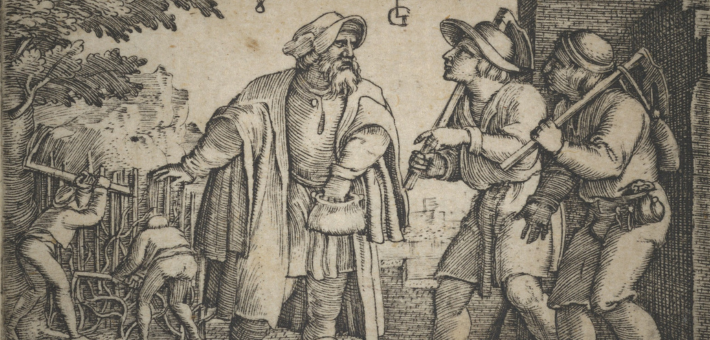Commentary on Exodus 17:1-7
At the outset of this passage, the Israelites leave the Sin desert (unrelated to the English word “sin”). They end up in Rephidim, the last stop before the wilderness of Sinai (see Exodus 19:2). Like many other locations in Exodus, scholars do not know Rephidim’s exact location.
What we do know is that Rephidim is within the Sinai Peninsula, a vast barren desert. The lack of water there is a serious and life-threatening problem even in modern times. Vegetation of any sort is difficult to find amid this wasteland. Yellow, tan, and brown hues dominate the landscape.
Demanding water (17:2–3)
Few words are more likely to foreshadow death than “there was no water for the people to drink” (17:1). Survival depends on water. Our bodies—our very selves—are about 60% water by weight. Every part of our bodies requires water to live. As the Mayo Clinic puts it, “Every cell, tissue and organ in your body needs water to work properly.” Water carries toxins away, maintains temperature, prevents joints from scraping, and protects vital tissues.¹
The New Revised Standard Version says, “The people quarreled with Moses,” but the Hebrew word for “quarrel” (rib) refers to lodging a complaint, such as one might do in a lawsuit. The people demand that their leader give them water. Moses grows irritated by their request. A defensive leader, he asks why they are complaining. The answer is ridiculously obvious: the people don’t want to die. Moses also asks them why they are testing God. But as we will see, God does not take offense at their requests. God gives them exactly what they request.
To be clear, there are times when the people complain in the wilderness, and they should have kept their mouths shut. When they grumble about something minor like a lack of onions (Numbers 11:5), God responds angrily. In those cases, they’re ignoring their miraculous rescue out of slavery, foolishly wishing they were back in the house of bondage. When the people need something to survive, however, their complaints have a different quality, and God always provides. When water is undrinkable, God makes it sweet (Exodus 15:22–27). When they have no food, God rains down bread from heaven (Exodus 16:1–32).
Here, they need water. They talk specifically about thirst killing not only themselves, but also their children and animals (17:3). Children, especially young ones, are at high risk for dehydration. Animals would be kept close to people at all times. Even once the Israelites move into the land and build settlements, they would often share their houses with farm animals. These animals, moreover, would often be the most valuable possessions people owned. They do little good, however, as corpses (see also Leviticus 22:8).
God’s plan (17:4–6)
Even though Moses is far from perfect, he is smart enough to consult God about his problems (17:4). He “cried out” to God, and the verb used there (tsa‘aq) is exceptionally strong, often used in response to life-threatening circumstances (such as Exodus 14:10). Indeed, Moses worries that the people will stone him (17:4).
God responds to both Moses’ worry about his life and the people’s concern about theirs. Following God’s orders, Moses takes elders, probably for protection from a desperate people. He sets forth with his trusty shepherd’s staff, which has played a role in multiple miracles involving snakes (Exodus 4:2-4), blood-red water (7:14–25), thunder and hail (9:23), locusts (10:13), and the splitting of the sea (14:16). He goes to a rock where God is present (17:6), which is interesting because Paul will later associate this rock with Jesus (1 Corinthians 10:4). As God ordered, Moses strikes the rock, and life-giving water gushes forth.
The aftermath (17:7)
Moses gives the place a double name: Massah and Meribah. The first word is related to testing, an echo back to 17:2 where Moses asks why the people test God. Victor Hamilton translates it, “Testingville.” The second is related to quarreling or lodging a complaint, also featured in 17:2, and Hamilton calls it, “Complainingburg.”²
When it happens all over again (Numbers 20:2–13)
The people travel from Rephidim here and spend time at the base of Mount Sinai (19:2). After many months, they eventually set forth for the promised land. As they make their way there, this episode seems to happen all over again (Numbers 20:2–13). There is no water (20:2). The people complain to Moses (20:3–5). Moses—with Aaron this time—consults God (20:6–7). Afterward, they go to a rock, strike it, and out flows water (20:9–11). The name of the place becomes, once again, Meribah (20:13).
This time around, however, some disturbing twists take place. Moses and Aaron insult the thirsty people, calling them “rebels.” Rather than giving God credit, Moses and Aaron speak as if they are the ones powerful enough to bring water out of the rock (20:10). And God responds by saying that these two leaders shall not enter the promised land (20:12). Though the people were clearly a difficult group to lead, God holds leaders to high standards of accountability. Even Moses and Aaron had their shortcomings, and they suffer as a result.
Notes:
- Mayo Clinic Staff, “Water: How Much Should You Drink Every Day?” The Mayo Clinic (Oct 12, 2022), https://www.mayoclinic.org/healthy-lifestyle/nutrition-and-healthy-eating/in-depth/water/art-20044256.
- Victor P. Hamilton, Exodus: An Exegetical Commentary (Grand Rapids: Baker Academic, 2011), 264.


October 1, 2023